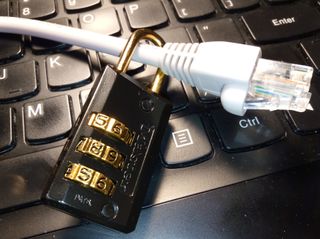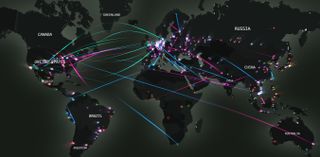Should I use a VPN for gaming?
Protecting your privacy is important whether you're surfing or fragging.


Interested in signing up for a VPN? Check out our guide to the best VPN for PC gaming.
Your computer’s personal IP address is a digital fingerprint that identifies you on the internet and affects what you can do and see online. For legal, practical, and business reasons, websites, streaming, and gaming services display different content depending on what is determined as your country of origin.
Examples of where your IP address affects what you can see or do online could be a website changing the default language that its text appears in, a site having to show warnings or block content because it has to adhere to specific laws in a certain country, matchmaking services connecting you to servers it thinks will provide the best in-game experience, and video-on-demand services providing different licensed content to different geographical regions.
Using simple tools, knowing an IP address makes it easy to work out someone’s ISP and geographical location (including both country and city) and track that person’s online activities. This information plays a big part in how online advertising systems deliver content it thinks will be most relevant to you. From an IP address, it’s never too hard to track down who exactly the real person is behind anything they do online.
For a wide variety of reasons, some people choose to hide their real IP address when using the internet, and keep their identity hidden, and one of the most of the most popular technologies to do so is to use a VPN.
What is a VPN?
VPN stands for Virtual Private Networking, a technology that allows your computer to connect securely and privately with another computer over the internet as if it were part of a local network, in a bubble where the outside world cannot gain access to communications or know where individual client machines are located. At least that's how it works in theory.
When you connect to a VPN, your computer makes all outgoing and incoming connections to the internet via a server in a specific country, owned and maintained by your VPN provider. Every packet that goes between you and the VPN is encrypted, and your online identity appears to be that of your VPN provider, not from your real ISP.
When you’re doing anything online while connected to a VPN, from accessing websites to playing games, your identity will appear to be using a different IP address from that issued by your own ISP, and a different DNS service.
The biggest gaming news, reviews and hardware deals
Keep up to date with the most important stories and the best deals, as picked by the PC Gamer team.
However VPNs were not invented as a privacy tool. The same technology is employed by business, public services and the military—allowing crucial documents and data to be exchanged remotely via encrypted connections, without the worry that a third party may gain access to confidential information, which could have catastrophic consequences.
What are the benefits of using a VPN?
VPNs have capabilities beyond these three examples though, some of which could make a difference to both how you play games and enjoy content on the internet. Here are some examples:
1) It’s not unheard of for ragey losers in games to stalk opposing players, find their IP address and track them down in real life. Although this behaviour is completely deranged and highly unlikely to happen, you might feel less bothered by your opponent's insults and threats knowing your identity shows you’re connecting to the game from a location in rural Timbuktu, rather than your real IP address.
2) Using your computer with free public wi-fi in places such as cafés and transport may not be secure, either from other users (the guy in the corner drinking his latte with a teaspoon might be port scanning every laptop in the room) or the premises may be logging every connection you make.
3) Network admins in the workplace and colleges routinely go to lengths to block internet access, restricting ports used for games, restricting certain websites and restricting torrent use. A VPN may get round these restrictions.
4) If you’re in the EU, due to GDPR you’re probably getting used to seeing website after website repeatedly ask for consent over cookies and advertising, or find some sites have had to block access from EU countries while they comply with the legislation—currently an issue with certain US media titles. Whether or not this approach to user data is a good thing, it’s just one more pop-up to have to endure when browsing the web. Connecting via a VPN hosted in a non-EU country will see those pop-ups gone.
5) Although the additional layer of a VPN often means slower download speeds, in some cases, you may find downloads go faster through a VPN host.
6) Some streaming services offer region-locked content that due to various copyright issues can only be viewed in certain countries. A VPN is a possible solution, making you appear to be from a country where extra content is available. The big one here is Netflix, with certain TV shows and films only available in the US, UK and so on. Unfortunately, Netflix has now cottoned on to this, and blocked many VPNs from viewing video streams.
7) Besides gaming, there are many political reasons to use a VPN. Some countries, such as China, block vast swathes of websites that, in order to limit public knowledge about the outside world, or criticism of the regime, their government decides its citizens should not see. Using a VPN gets around these restrictions, opening up the full and free web. In times of conflict, oppressive governments impose outright blocks on much of the internet, restricting information flowing both in and out of a country. VPNs can be a way to get this information out.
How do I use a VPN?
In general, VPNs can be set up in one of three ways: via Windows’ networking configuration pages, where you’ll need to enter your VPN username and password and select all the correct settings—usually given to you by your VPN provider; via software that is downloaded to your computer, sits in your system tray and when activated, only allows communications via the VPN; or via your router’s built-in software (if it supports VPNs), which will mean every device on your network connects through the VPN.
There’s a wide range of VPN services available, some of which can be used for free, and some of which require a subscription fee. Be especially wary of free services. A free VPN service still needs some way to fund its existence, and although it may hide your computer in a bubble from the outside world, you do share that bubble with other users and with the VPN provider itself, which has access to a lot of information about you’re really using the internet.
Some VPN providers let you connect to two servers—one as an entry point, another as an exit point—as a further layer of anonymity. Although the resilience of this added layer of security has never really been tested, it definitely sounds more secure than using a single server, as it makes it just that much harder to pinpoint you and your information. Your ISP only sees you connect to server A. The website you visit only sees you connecting from server B. The VPN provider is the only one who knows you are connected from A to B.
What does a VPN do for PC gaming?
Using a VPN means adding another layer between you and the outside world. Unfortunately, that means extra latency. How much extra latency depends on where your VPN server is based, and where the server is that you’re trying to connect to. If you want to use a VPN, you’ll need to put some thought into this before you start gaming.
Using a VPN doesn’t mean your low-ping sniping days are over though. Most VPN providers offer a number of different countries to connect to. The simple solution is to connect to the server with the lowest ping time. VPN software often comes with a ping tool that displays the latency of every server in the list, so either just choose one that’s located close to you geographically, or the one with the lowest ping.
Depending on how good your VPN provider is and how stable a specific VPN server is, you might run into a few extra issues. VPN servers can sometimes go down randomly or just become unstable, in which case you’ll be booted out of your game or run into packet loss problems. It’s impossible to really know how well a VPN provider performs with gaming until you sign up and try it yourself, which can be a risky bet if the provider doesn’t offer a trial period. Even then, some of the servers may be better than others, and it may require some trial and error to find one that’s reliable.
The number of factors involved means going on word of mouth recommendations for gaming performance may not always work either. A user with a slow 10Mbit home broadband connection may have had a bad experience with the local servers, while a lucky gamer with a 1Gbit connection may love the service, but neither says much about how well the service will work for you.
Do VPNs guarantee privacy?
Despite what you may read, there’s no sure-fire way to guarantee absolute privacy with a VPN. VPN providers may be forced by law of their host country to keep logs about who connects to them, and might be forced to hand over details when the boys in blue (or red) coming knocking at the door. There are also numerous flaws in VPN technology that can uncover a user’s real identity, such as a “man in the middle attack” or DNS leaking. But as usual on the internet, there are ways to mitigate these risks.
There are anecdotal reports that, in the past, VPNs have been broken into by government agencies—although it is unclear how this was achieved. And like any aspect of computer security, the technology is a cat and mouse game between the researchers who want to design better encryption and security and those who wish to break it. There is no way to know if boffins who work for well-funded organisations have figured out an exploit in all VPN protocols, or if they can break through encryption that allows them to bypass existing security methods.
But you can take the tin foil hat off now. There’s (presumably) little chance one of these agencies wastes time tracking down students playing Fortnite on their college network, or people who want to watch a new Game of Thrones episode a few days early.
Most Popular

